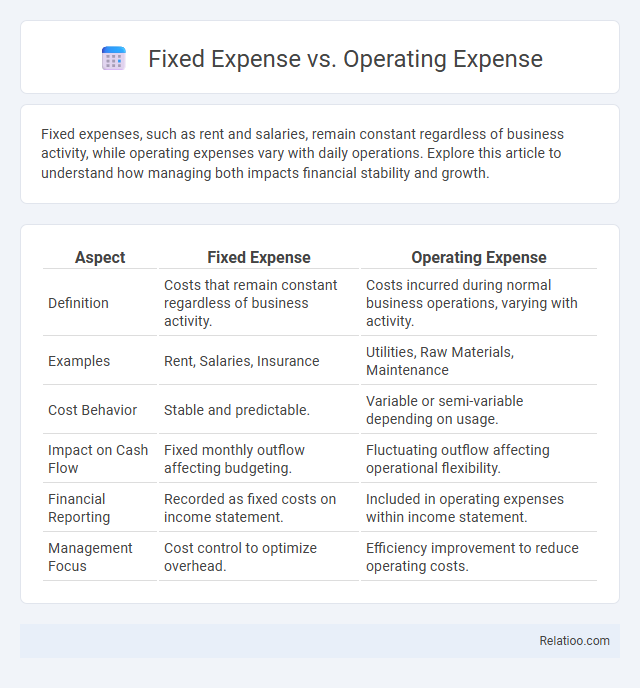Fixed expenses, such as rent and salaries, remain constant regardless of business activity, while operating expenses vary with daily operations. Explore this article to understand how managing both impacts financial stability and growth.
Table of Comparison
| Aspect | Fixed Expense | Operating Expense |
|---|---|---|
| Definition | Costs that remain constant regardless of business activity. | Costs incurred during normal business operations, varying with activity. |
| Examples | Rent, Salaries, Insurance | Utilities, Raw Materials, Maintenance |
| Cost Behavior | Stable and predictable. | Variable or semi-variable depending on usage. |
| Impact on Cash Flow | Fixed monthly outflow affecting budgeting. | Fluctuating outflow affecting operational flexibility. |
| Financial Reporting | Recorded as fixed costs on income statement. | Included in operating expenses within income statement. |
| Management Focus | Cost control to optimize overhead. | Efficiency improvement to reduce operating costs. |
Introduction to Fixed and Operating Expenses
Fixed expenses are costs that remain constant regardless of business activity, such as rent and salaries. Operating expenses encompass all costs required for the day-to-day functioning of a business, including variable costs like utilities and supplies. Understanding the distinction between fixed and operating expenses is crucial for accurate budgeting and financial analysis.
Defining Fixed Expenses
Fixed expenses are costs that remain constant regardless of business activity, such as rent, insurance premiums, and salaries of permanent staff, providing predictable outflows each accounting period. Operating expenses include both fixed expenses and variable expenses, encompassing all costs necessary to run daily operations, like utilities, marketing, and office supplies. Understanding fixed expenses is crucial for budgeting and financial forecasting, as these costs must be covered even when revenues fluctuate.
Defining Operating Expenses
Operating expenses refer to the regular, recurring costs a business incurs to maintain its core functions, including salaries, rent, utilities, and office supplies. Unlike fixed expenses, which remain constant regardless of production levels, operating expenses can be both fixed and variable, adapting to the scale of business activities. Understanding the distinction between fixed expenses, operating expenses, and variable expenses is essential for effective financial planning and cost management.
Key Differences between Fixed and Operating Expenses
Fixed expenses represent costs that remain constant regardless of business activity levels, such as rent, salaries, and insurance premiums. Operating expenses include both fixed and variable costs necessary to run daily business operations, like utilities, office supplies, and maintenance. The key difference lies in fixed expenses being stable and predictable, while operating expenses fluctuate with business volume and operational demands.
Examples of Fixed Expenses
Fixed expenses remain constant regardless of your business activity level, such as rent, salaries, and insurance premiums. Operating expenses include both fixed and variable costs necessary for daily operations, like utilities, office supplies, and maintenance. Understanding these distinctions helps you manage budgeting and financial planning effectively.
Examples of Operating Expenses
Operating expenses include costs such as rent, utilities, salaries, marketing expenses, and office supplies, which are essential for daily business operations but do not directly contribute to product manufacturing. Fixed expenses, like lease payments or insurance premiums, remain constant regardless of production levels, while variable expenses fluctuate with production volume. Understanding the differences helps businesses manage budgets by distinguishing between regular operational costs and expenses tied directly to production or sales.
Impact on Business Budgeting
Fixed expenses such as rent and salaries remain constant regardless of production levels, providing stability in your business budgeting by allowing predictable cost planning. Operating expenses, including utilities and maintenance, fluctuate with business activity and require careful monitoring to avoid unexpected budget overruns. Understanding the distinction between fixed and operating expenses is crucial for accurately forecasting cash flow and ensuring sustainable financial management.
Managing Fixed and Operating Expenses
Managing fixed and operating expenses is crucial for maintaining financial stability and optimizing cash flow. Fixed expenses, such as rent and salaries, remain constant regardless of production levels, while operating expenses include variable costs like utilities and maintenance that fluctuate with business activity. You can enhance budget control and profitability by regularly analyzing these expenses and identifying areas to reduce unnecessary spending without compromising operational efficiency.
Importance in Financial Reporting
Fixed expenses, operating expenses, and variable expenses each play crucial roles in financial reporting by providing distinct insights into a company's cost structure and financial health. Fixed expenses represent consistent costs that do not fluctuate with production levels, offering stability in budgeting and forecasting. Operating expenses encompass both fixed and variable costs related to day-to-day operations, aiding in assessing overall operational efficiency and profitability.
Tips for Effective Expense Optimization
Understanding Fixed Expense, Operating Expense, and Variable Expense is crucial for effective expense optimization. You should analyze fixed expenses like rent and salaries separately from operating expenses, which include utilities and general administrative costs, to identify areas where cost control can be most effective. Prioritize tracking variable expenses that fluctuate with production levels, enabling targeted strategies to improve your business's financial efficiency.

Infographic: Fixed Expense vs Operating Expense
 relatioo.com
relatioo.com